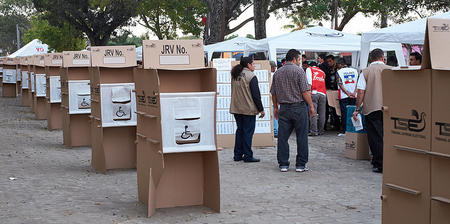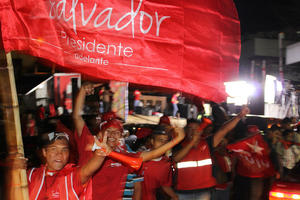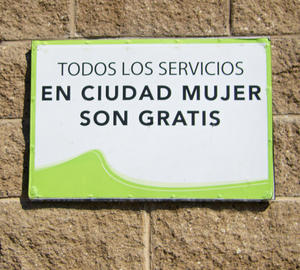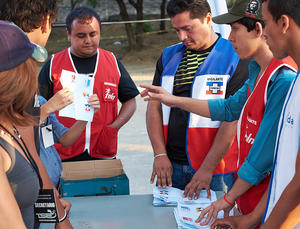
This Sunday, March 9th, El Salvador will elect its next president in a run-off election. The candidate for the leftist Farabundo Martí National Liberation Front (FMLN), Salvador Sánchez Cerén, has a strong lead over right wing candidate, Norman Quijano, from the Nationalist Republican Alliance (ARENA); polls show the FMLN with up to a 16-point margin (CID-Gallup, February 19). This moment is something of a dreamscape for those who set down their weapons just over 22 years ago when the 1992 Peace Accords were signed. When the guerrillas came down from the mountains and the military stopped hunting its citizens and the U.S. government stopped signing checks to fund the military, those on the left wondered if the moment for real political change had passed.
Sánchez Cerén is currently Vice President of the first ever FMLN government and served as the Minister of Education until he stepped down in 2012 to announce his candidacy. He was born to a carpenter and a market seller in Quetzaltepeque just outside the capital. He spent his early life as a schoolteacher in rural areas, and was a member of ANDES-21 de junio: a teachers union that played a critical leading role in El Salvador’s popular movement in the 1970s. During the war, he was an FMLN commanding general under the pseudonym Leonel González, the lion. Sánchez Cerén embodies many of the principles and goals of the Salvadoran resistance: an end to malignant poverty and social repression, economics that benefit all Salvadorans, and political representation that reflects the needs of the many.
Norman Quijano, ARENA’s candidate, is the current mayor of the capital city, San Salvador, and a former oral surgeon, which has earned him the sinister nickname “the dentist.” The National Republican Alliance (ARENA) emerged in the 1980’s, founded by Roberto D’Aubuisson, the School of the Americas-trained father of the death squads, who planned and ordered the assassination of Archbishop Oscar Romero in 1980.
The new president will take on a country mired in violence. El Salvador has one of the highest rates of femicide in the world. Formed in the streets of Los Angeles by refugees of the war and deported back to El Salvador, the Mara Salvatrucha and Barrio18 gangs contribute to a yearly homicide rate similar to the death rate at the height of the civil war. Not just physical violence plagues El Salvador, but economic violence as well. The disparity between the rich and the poor is the same as, if not greater, than it was before the civil war. In the words of Roger Blandino Nerio, former mayor of Mejicanos, in the outskirts of the capital, “The economy of El Salvador is a corpse,” despite and because of U.S., World Bank and IMF schemes to make the country a welcome mat for international investment.

The FMLN government plan that Sánchez Cerén and his running mate Óscar Ortiz propose was developed through a country- and diaspora-wide consultation. The National Dialog for the El Salvador We Want called for proposals through online submission forums, door to door visits, and thematic work groups that included labor unions, garment workers, LGBT and sex-worker organizations, climate justice activists, youth groups, and artists, among many others.
The significance of these elections is part of the historical struggle between the extreme right and revolutionary left in El Salvador. In 1932 Agustín Farabundo Martí led an indigenous uprising for land rights. Then-president, General Maximiliano Hernández Martínez, who took office through one of many military coups, met the rebellion with extreme force and nearly eradicated the indigenous population of the country—over 30,000 died in the course of a few weeks during La Matanza, or massacre.
During the 1970s, when the Salvadoran popular movement had once again emerged from the terrifying shadows of the 1932 massacre, priests teaching liberation theology were executed, protesting students were gunned down in broad daylight, and whole villages were disappeared into mass graves. Organized resistance groups, which unified as the FMLN in 1980, fought a guerrilla insurgency against the Salvadoran military. The United States funneled money to the military at a rate of a million dollars a day during the height of the Reagan Administration. After 12 years of official combat, the war ended with the Peace Accords in 1992. It was less than a draw: victory belonged to no one, but more than 70,000 had died. However, the Salvadoran military was reduced in size. Much of its military apparatus, including the Policía de Hacienda and the National Guard, which committed the worst atrocities, were dissolved, dramatically decreasing the state’s ability to unleash such a degree of violent repression on the population again.

So began the long transition between armed conflict and political combat: a much stickier and less-defined war zone. As a result of the Peace Accords, the FMLN was recognized as a legal political party. At the same time, the right-wing-controlled legislature soon passed an Amnesty Law protecting war criminals responsible for even the greatest atrocities of the war, thereby allowing them to continue to sit at the political table. With the likely victory of a candidate who has publicly supported overturning the Amnesty Law, the offices of human rights groups that documented war crimes and house archives from the civil war have been raided and closed.
In years past, voter intimidation and right-wing fraud has been well documented in El Salvador’s elections. Various forms of tyranny have been carried out over the years by U.S. State Department officials (overtly, at least during the Bush years) and U.S. Congressional representatives have threatened to deport Salvadorans living in the United States or to cut off remittances (the country’s largest source of income) if the FMLN won the presidency. For example, during the 2009 elections, Representative Trent Franks (R-AZ) said, “Should the pro-terrorist FMLN party replace the current government in El Salvador, the United States, in the interests of national security, would be required to reevaluate our policy toward El Salvador, including cash remittance and immigration policies to compensate for the fact there will no longer be a reliable counterpart in the Salvadoran government.”
Meanwhile the Salvadoran right wing was purchasing votes for cash and commercial goods. They gave citizens of Honduras and Guatemala the identification cards of the Salvadoran dead, bussed them in, set them up in empty buildings with mattresses on the ground, and paid them for their forged allegiance at the polls.
But despite the collusion of forces, “hope triumphed over fear,” (as the FMLN said), when their candidate, Mauricio Funes, independent and well-liked journalist, was elected by the Salvadoran people to the presidency in 2009. Funes, a, FMLN-sympathizer but decidedly not a member, had the popularity needed to break ARENA’s 20-year hold on the presidency and offer Salvadorans a viable alternative to right-wing rule. The administration inherited a country that was on the verge of bankruptcy and with one of the highest homicide rates in the world.
Funes and the FMLN have accomplished a great deal in the last five years, including many new social programs. For example, hundreds of new community health teams have been working out of new clinics throughout the country, providing free comprehensive care, resulting in a massive drop in birth-related deaths and infant mortality. The vaso de leche program, implemented by Sánchez Cerén as Minister of Education, offers students a free glass of milk at school. The government also employs thousands of Salvadoran artisans, garment workers, and others to produce notebooks, school uniforms, and shoes for millions of kids. 21 cities have been declared illiteracy-free thanks to the Cuban-inspired National Literacy Program, in which over 9,000 high-school and college students have volunteers to teach adults in their communities.
One of the most noteworthy programs is Ciudad Mujer: Women’s City.

Ciudad Mujer centers are women only (trans-women inclusive) facilities that offer integral health care from violence prevention to economic autonomy to psychological and legal services. They have 24-hour police on staff for domestic violence reports, and daily job training programs that offer everything from marketing advice to auto-mechanic classes. Quijano, the dentist, has been rumored to joke that if he were President, he would turn Cuidad Mujer into a prison complex.
These social programs are just one of the hopeful signs of a more robust and participatory democracy taking root. The first round of the 2014 elections took place on February 2 and was touted by Salvadorans and international observers as potentially the most transparent and democratic elections to date; even the U.S. Embassy agreed that it was a success in terms of fairness and transparency. Under the leadership of the FMLN, the Supreme Electoral Tribunal (TSE) implemented new voting regulations to minimize the capacity for fraud and maximize citizen participation in the electoral process. These were the first elections where the new neighborhood voting plan had been fully implemented across the country, resulting in over 1,000 new voting centers. (Previously, citizens were divided alphabetically across their municipality, meaning that in some cases, particularly in rural areas, voters would have to travel for hours on foot in order to reach their voting place).

Included in the new regulations were guidelines for respectfully confirming transgender voters’ identities. Also physical accessibility, an issue regularly ignored, was addressed by having scouts in locations with stairs or uneven pavement to help lead and sometimes carry people to their voting table (an awkward solution at best, but an effort that has never been made before). The groundwork for the voto exterior was laid, inviting Salvadoran citizens living outside of the country (of which there are over two million) to vote by absentee ballot for the first time. The message of the FMLN-led TSE was overwhelmingly clear: All Salvadoran citizens have the right to participate in electing their government.
Something else was different about February’s election: The U.S. government was practically silent. In the months and weeks preceding the elections, the U.S. Embassy repeatedly pledged neutrality and stated its commitment to work with whichever party is elected. The declarations of neutrality by the U.S. Ambassador Mari Carmen Aponte, and the otherwise eerie, but welcome, silence from the U.S. State Department regarding the elections, is especially anomalous given that the United States, despite explicit evidence of right wing-fraud, backed the conservative parties in Honduras less than six months ago.
El Salvador is rarely covered in U.S. media, but when it does make the news it is mostly in conjunction with organized crime: narco-traffickers, Mara Salvatrucha, and the Barrio 18 gang. The privatization measures and the trade agreements that slash labor laws, which the U.S. strong-arms through the Salvadoran legislature, do not make the news. Neither do the groundbreaking social programs that offer real solutions and opportunities for Salvadorans to thrive in El Salvador, nor the creative and effective efforts to resuscitate a local economy that has been devastated by serving the interests of foreign multi-nationals.
It seems unlikely that Salvadorans will elect to return to the days of endless extraction, especially with an oral surgeon at the helm. In the three-way race on February 2, the FMLN finished ten points ahead of ARENA, and one percentage point away from the 50%-plus-one vote absolute majority needed to take the presidency in the first round. Five short years of a leftist government was sufficient to show the electorate a new vision of El Salvador. This Sunday, Salvadorans will elect that future.
Cecca Ochoa is a Salvadoran American living in Brooklyn, NY. She is a member of CISPES, the Committee in Solidarity with the People of El Salvador. She recently returned from El Salvador after participating as an International Observer for the February 2nd elections. She serves as Editorial Nonfiction Editor for Apogee Journal.

